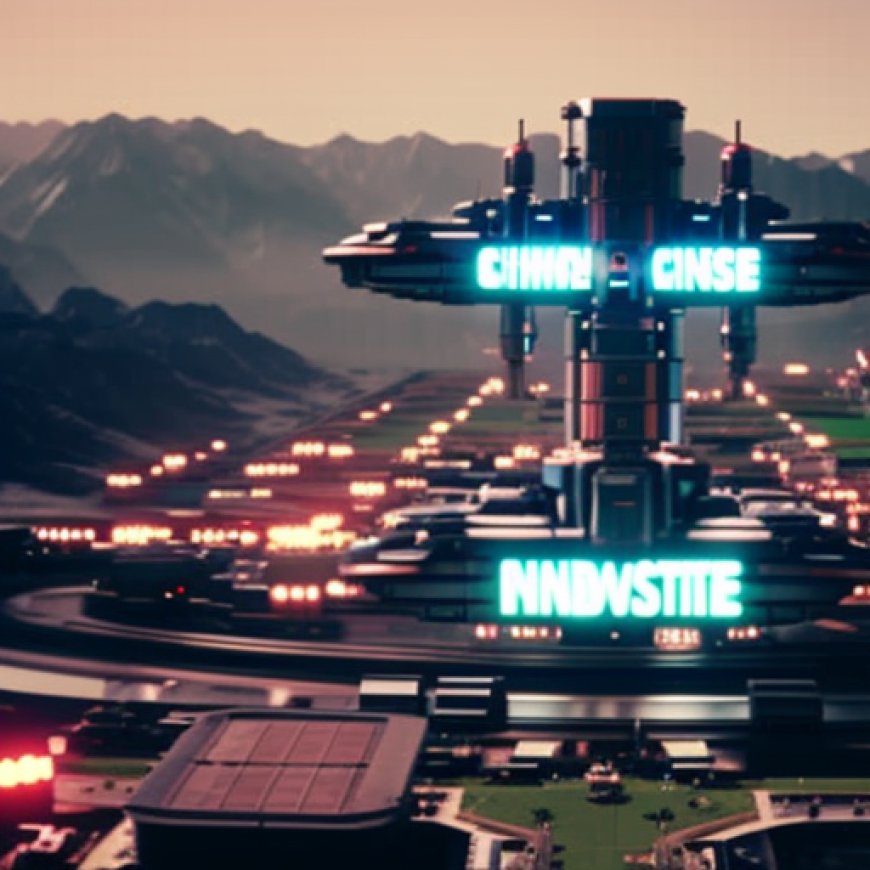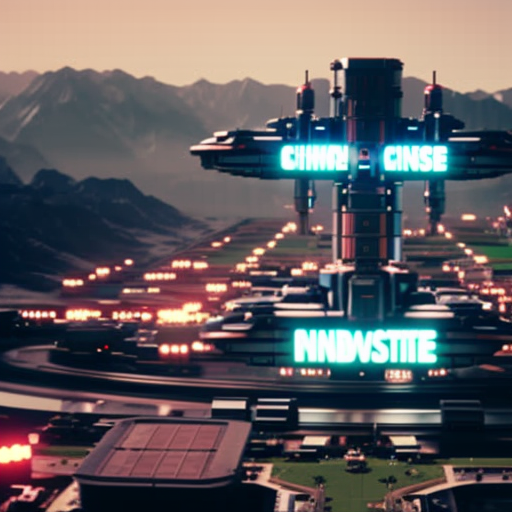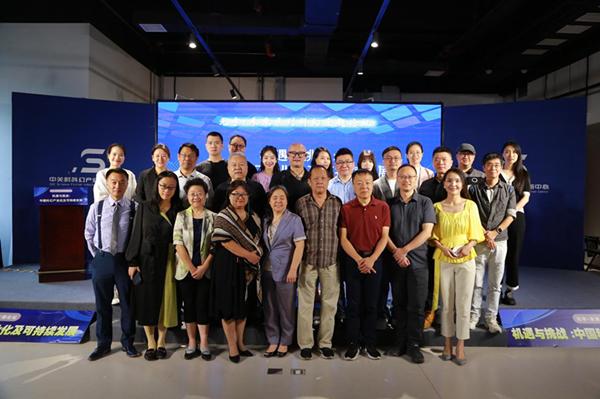Chinese sci-fi industry explores sustainable growth and industrialization at forum
Chinese sci-fi industry explores sustainable growth and ... China.org


Chinese Sci-Fi Industry Explores Sustainable Growth and Industrialization at Forum
Introduction
A forum was held in Beijing on September 23, 2023, to discuss the opportunities and challenges presented by the industrialization and sustainable development of Chinese science fiction. The event brought together sci-fi experts, writers, and industry leaders to explore the future of the genre in China.
Opportunities and Challenges in China’s Sci-Fi Industry

Yin Chuanhong, deputy secretary of the Chinese Writer Association of Science Popularization, highlighted the significant growth of China’s sci-fi industry. He emphasized the importance of innovation and skilled individuals in shaping the future world, which will be influenced by technological advancements. Yin Chuanhong stated that science fiction will play a central role in navigating these possibilities and challenges.
The Development of Sci-Fi in China
In his keynote speech, sci-fi author Yang Peng analyzed the development of sci-fi across five domains: culture, era, technology, communication, and innovation. He emphasized the need to champion the growth of the sci-fi sector and accomplish the goals of industrialization, commercialization, and serialization through proactive innovation.
Aligning Sci-Fi with Societal Progression
Jiang Bo, an accomplished writer, expressed the importance of aligning sci-fi with societal progression and technological advancement in order to gain widespread popularity. He encouraged science fiction authors to navigate the genre’s evolution with passion and enthusiasm.
Blending Science and Art for Innovation
Sun Shicheng, the general manager of Zhongguancun Science Fiction Industry Innovation Center, shared ongoing experiments that blend science and art. The goal is to establish a hub for innovative ideas and create a platform for connections, collaborations, and services. Sun Shicheng emphasized the importance of partnerships with diverse sci-fi professionals to achieve genuine breakthroughs and foster the industry’s growth.
Roundtable Discussions
The forum included two roundtable discussions titled “From Science Fiction Creation to Independent Innovation in the Sci-fi Industry” and “Exploration of the Future and Sustainable Growth of China’s Sci-fi Sphere.” Renowned writers, specialists, and industry frontrunners enriched the discussions.
Enhancing Cultural Foundation and Quality
Xu Yanli, a sci-fi researcher and writer, suggested launching influential studies on sci-fi classics to attract greater societal attention. She emphasized the need to refine these classics to enhance their quality and cultural foundation.
Organic and Sustainable Development
Liu Bing, a professor at Tsinghua University, cautioned that the industrialization of the sci-fi industry should be supported by a foundation tailored to local conditions. This approach ensures organic and sustainable development, preventing trend-following or forced implementations that could lead to waste.
Promotion, Marketing, and Legal Rights
Cui Li, a senior partner at Jingshi Law Firm, offered insights on motivating sci-fi enthusiasts to become writers and produce more original works. She underscored the importance of promotion, marketing, and enhancing the protection of creators’ legitimate rights and legal rights specific to sci-fi creators.
Improving the Quality of Chinese Sci-Fi
Xu Yangke, a former deputy editor-in-chief at China Science and Technology Press, highlighted the relatively limited content of Chinese sci-fi compared to the West. He emphasized the need to improve the quality of Chinese sci-fi pieces and advocated for state-supported measures such as tax benefits and curriculum changes. Xu Yangke also emphasized the integration of sci-fi into educational settings.
Conclusion
The forum concluded with the belief that China’s sci-fi industry has significant room for growth. The national and governmental levels are ardently promoting science fiction to mold China into an innovative nation. The integration of sci-fi into various sectors and the emphasis on sustainable development align with the Sustainable Development Goals (SDGs) set by the United Nations.
SDGs, Targets, and Indicators
| SDGs | Targets | Indicators |
|---|---|---|
| SDG 9: Industry, Innovation, and Infrastructure | Target 9.5: Enhance scientific research, upgrade the technological capabilities of industrial sectors in all countries, in particular developing countries, including, by 2030, encouraging innovation and substantially increasing the number of research and development workers per 1 million people and public and private research and development spending. | No specific indicators mentioned in the article. |
| SDG 4: Quality Education | Target 4.7: By 2030, ensure that all learners acquire the knowledge and skills needed to promote sustainable development, including, among others, through education for sustainable development and sustainable lifestyles, human rights, gender equality, promotion of a culture of peace and non-violence, global citizenship, and appreciation of cultural diversity and of culture’s contribution to sustainable development. | No specific indicators mentioned in the article. |
| SDG 8: Decent Work and Economic Growth | Target 8.2: Achieve higher levels of economic productivity through diversification, technological upgrading, and innovation, including through a focus on high-value-added and labor-intensive sectors. | No specific indicators mentioned in the article. |
1. Which SDGs are addressed or connected to the issues highlighted in the article?
SDG 9: Industry, Innovation, and Infrastructure
The issues highlighted in the article are connected to SDG 9, which focuses on promoting inclusive and sustainable industrialization and fostering innovation. The article discusses the industrialization and sustainable development of the Chinese science fiction industry, emphasizing the importance of innovation and technological advancements.
SDG 4: Quality Education
The issues highlighted in the article are also connected to SDG 4, which focuses on ensuring inclusive and equitable quality education and promoting lifelong learning opportunities for all. The article mentions the importance of refining sci-fi classics, launching influential studies on sci-fi classics, and integrating sci-fi into educational settings.
SDG 8: Decent Work and Economic Growth
The issues highlighted in the article are connected to SDG 8, which focuses on promoting sustained, inclusive, and sustainable economic growth, full and productive employment, and decent work for all. The article discusses the growth of the sci-fi industry and the need for partnerships with sci-fi professionals to support the industry’s growth.
2. What specific targets under those SDGs can be identified based on the article’s content?
Target 9.5: Enhance scientific research, upgrade the technological capabilities of industrial sectors in all countries, in particular developing countries, including, by 2030, encouraging innovation and substantially increasing the number of research and development workers per 1 million people and public and private research and development spending.
This target can be identified based on the article’s emphasis on the importance of innovation, technological advancements, and the growth of the sci-fi industry. The article highlights the need for skilled individuals, deep innovation, and accomplishing the goals of industrialization, commercialization, and serialization in the sci-fi sector.
Target 4.7: By 2030, ensure that all learners acquire the knowledge and skills needed to promote sustainable development, including, among others, through education for sustainable development and sustainable lifestyles, human rights, gender equality, promotion of a culture of peace and non-violence, global citizenship, and appreciation of cultural diversity and of culture’s contribution to sustainable development.
This target can be identified based on the article’s mention of refining sci-fi classics, launching influential studies on sci-fi classics, and integrating sci-fi into educational settings. The article emphasizes the cultural foundation of classic sci-fi works and the importance of promoting knowledge and skills related to sci-fi and sustainable development.
Target 8.2: Achieve higher levels of economic productivity through diversification, technological upgrading, and innovation, including through a focus on high-value-added and labor-intensive sectors.
This target can be identified based on the article’s discussion of the growth of the sci-fi industry and the need for partnerships with a diverse range of sci-fi professionals. The article highlights the role of the sci-fi industry in bolstering related sectors or technologies and emphasizes the importance of creative expertise and enthusiasm in driving the industry’s growth.
3. Are there any indicators mentioned or implied in the article that can be used to measure progress towards the identified targets?
No specific indicators are mentioned or implied in the article that can be used to measure progress towards the identified targets.
SDGs, Targets, and Indicators
| SDGs | Targets | Indicators |
|---|---|---|
| SDG 9: Industry, Innovation, and Infrastructure | Target 9.5: Enhance scientific research, upgrade the technological capabilities of industrial sectors in all countries, in particular developing countries, including, by 2030, encouraging innovation and substantially increasing the number of research and development workers per 1 million people and public and private research and development spending. | No specific indicators mentioned in the article. |
| SDG 4: Quality Education | Target 4.7: By 2030, ensure that all learners acquire the knowledge and skills needed to promote sustainable development, including, among others, through education for sustainable development and sustainable lifestyles, human rights, gender equality, promotion of a culture of peace and non-violence, global citizenship, and appreciation of cultural diversity and of culture’s contribution to sustainable development. | No specific indicators mentioned in the article. |
| SDG 8: Decent Work and Economic Growth | Target 8.2: Achieve higher levels of economic productivity through diversification, technological upgrading, and innovation, including through a focus on high-value-added and labor-intensive sectors. | No specific indicators mentioned in the article. |
Behold! This splendid article springs forth from the wellspring of knowledge, shaped by a wondrous proprietary AI technology that delved into a vast ocean of data, illuminating the path towards the Sustainable Development Goals. Remember that all rights are reserved by SDG Investors LLC, empowering us to champion progress together.
Source: china.org.cn

Join us, as fellow seekers of change, on a transformative journey at https://sdgtalks.ai/welcome, where you can become a member and actively contribute to shaping a brighter future.







